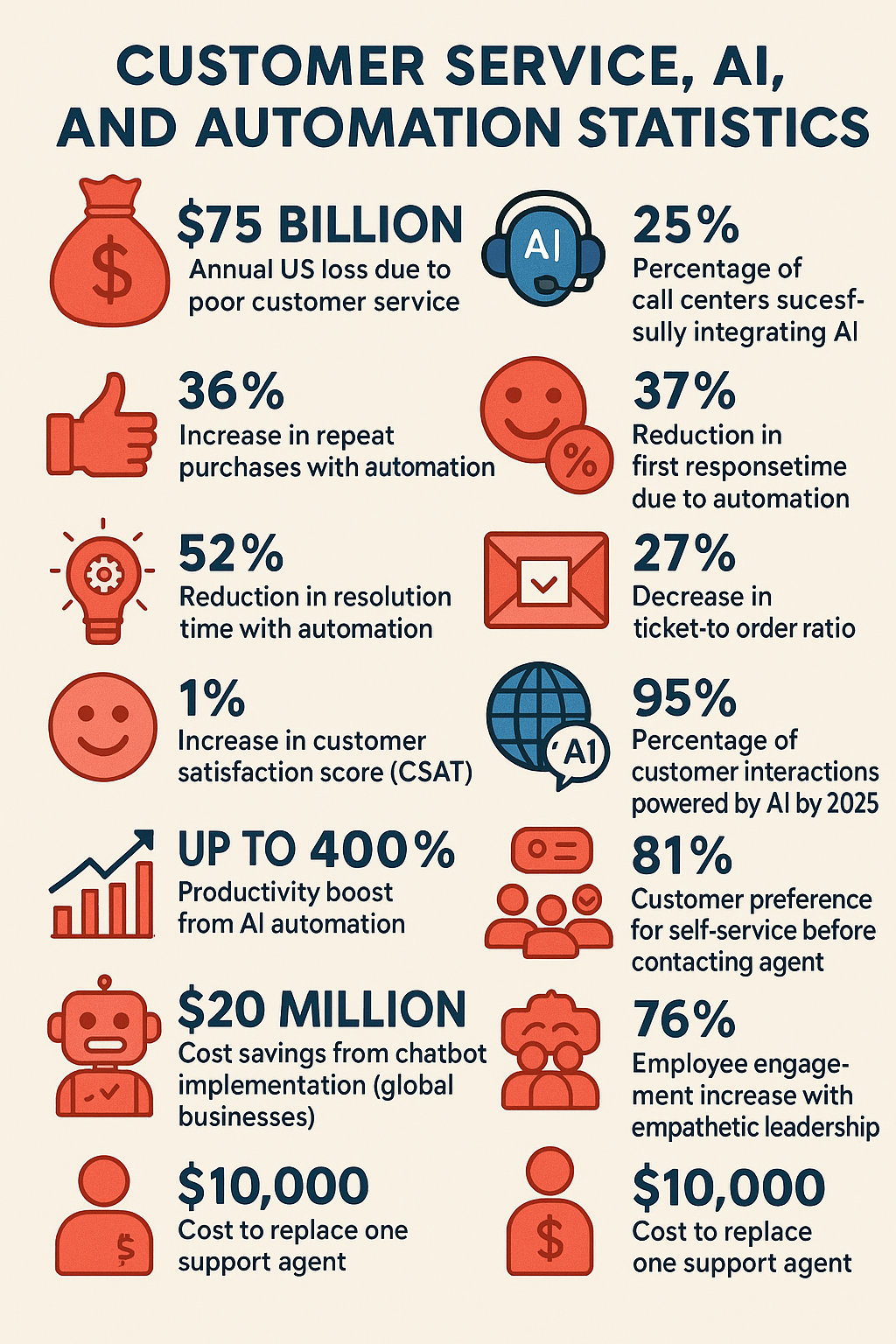Boost Customer Experience and Efficiency: The Power of Customer Support Automation
Discover how to transform customer service with automation. This guide offers practical steps to enhance efficiency and improve customer satisfaction
In today’s fast-paced digital economy, customer expectations are soaring. Customers demand immediate, personalized, and seamless support—across every channel and at any hour. For businesses, meeting these expectations efficiently and cost-effectively is a significant challenge. The solution? Customer support automation. By leveraging AI, workflow automation, and advanced support tools, organizations are revolutionizing the way they manage customer interactions, boost satisfaction, and drive growth.
✅ The Rise of Customer Support Automation
Customer support automation refers to the use of technology—primarily AI, chatbots, and workflow automation tools—to streamline and optimize customer service processes. This shift is not just a trend but a strategic necessity. According to a 2023 Gartner study, 80% of companies are now using AI to improve customer experience. The benefits are clear: faster response times, reduced costs, and enhanced customer satisfaction.
✅ Why Automation Matters
- 24/7 Availability: AI-powered systems ensure customers receive instant support at any time, regardless of time zone or business hours. In fact, 36% of experts highlight AI’s role in providing round-the-clock service.
- Efficiency and Speed: Automation tools can reduce customer service costs by up to 30% and boost customer satisfaction by 39%. Automated systems handle routine inquiries, freeing human agents for more complex tasks.
- Scalability: As businesses grow, automation allows support operations to scale efficiently without a proportional increase in resources.
✅ Key Components of Automated Customer Service
✍️Workflow Automation
Workflow automation is the backbone of modern support operations. By automating repetitive tasks—like ticket routing, follow-ups, and status updates—businesses can ensure consistent, error-free processes. This not only improves support team productivity but also ensures service level agreements (SLAs) are met with greater consistency.
✍️ AI in Customer Support
AI in customer support goes beyond simple rule-based systems. Modern AI tools can understand natural language, detect sentiment, and even predict customer needs. These capabilities lead to:
- Process Optimization: AI analyzes historical data to identify bottlenecks and optimize workflows.
- Personalization: AI tailors responses based on customer history and preferences, enhancing customer experience.
- Real-Time Analytics: AI-driven analytics provide insights into customer behavior, agent performance, and emerging trends, enabling continuous improvement in support processes.
✍️Support Ticket Management
Efficient support ticket management is crucial for delivering timely and effective support. Automation tools can:
- Categorize and prioritize tickets based on urgency and sentiment.
- Automatically assign tickets to the most suitable agents.
- Integrate with knowledge bases for instant, accurate responses.
- Track progress and ensure SLAs are consistently met.
✍️Chatbots in Customer Service
Chatbots are now a staple in customer service, handling up to 95% of interactions by 2025. They provide instant answers to common questions, guide users through self-service support options, and escalate complex issues to human agents when necessary. This reduces response time and increases overall customer satisfaction.
✍️Self-Service Support Options
Today’s customers prefer finding answers on their own—81% say they want more self-service options. Automated knowledge bases, FAQs, and interactive guides empower customers to resolve issues without waiting for an agent, reducing ticket volume and improving satisfaction.
✍️Multi-Channel Support
Automation enables seamless support across multiple channels—email, chat, social media, and phone. This ensures customers receive consistent, high-quality service wherever they choose to engage.
✅ The Business Impact: Real-World Statistics

These statistics underline the transformative impact of customer support automation on both operational efficiency and customer satisfaction.
✅ Benefits of Customer Service Automation
✍️ 1. Enhanced Customer Service Efficiency
Automation allows support teams to handle more queries with fewer resources. By automating routine tasks, agents can focus on complex issues, increasing job satisfaction and support team productivity.
✍️ 2. Response Time Reduction
Automated systems provide instant responses, dramatically reducing wait times. AI-driven ticket management ensures that inquiries are routed and resolved quickly, meeting or exceeding SLAs.
✍️ 3. Cost Reduction
By handling repetitive tasks, automation tools reduce the need for large support teams, cutting operational costs by up to 30%.
✍️4. Customer Experience Enhancement
AI-driven personalization, real-time analytics, and seamless multi-channel support combine to deliver a superior customer experience, boosting loyalty and retention.
✍️ 5. Continuous Improvement in Support Processes
Automation tools gather and analyze data from every interaction, enabling ongoing process optimization and continuous improvement in support processes.
✅ Real-World Case Studies
✍️ Case Study 1: IndiGo Airlines
IndiGo, one of India’s largest airlines, adopted conversational AI through YellowAI to automate customer support across WhatsApp and their website. The AI chatbot handled over 35 use cases, including web check-in, booking management, and flight information.
Impact:
- Achieved an 87% customer satisfaction score.
- 400,000 customers opted in for WhatsApp campaigns.
- Handled 42 million messages in a single quarter.
IndiGo’s experience demonstrates how AI-driven automation can manage massive interaction volumes, reduce support costs, and maintain high customer satisfaction at scale.
✍️ Case Study 2: Motel Rocks
Motel Rocks, a fashion retailer, integrated AI-powered chatbots and automation tools into their customer support strategy. The system enabled self-service for common inquiries and provided sentiment analysis to help agents prioritize and personalize interactions.
Impact:
- 43% of support tickets were deflected by AI agents.
- 50% reduction in ticket volume due to self-service options.
- 9.44% increase in customer satisfaction.
This case shows how customer support automation can drastically reduce workload for agents while improving customer experience and efficiency.
✅ Implementing Customer Support Automation: Best Practices
✍️1. Identify Automation Opportunities
Analyze support data to identify high-volume, repetitive tasks suitable for automation. Focus on areas where automation can deliver the greatest impact—such as FAQs, ticket routing, and feedback collection.
✍️ 2. Select the Right Automation Tools for Support
Choose tools that align with your business needs, scale with your operations, and integrate seamlessly with existing systems. Look for features like AI-powered chatbots, workflow automation, and real-time analytics.
✍️3. Integrate Knowledge Bases
A robust knowledge base is essential for effective self-service support options. Integrate AI to ensure resources are always up-to-date and accessible across all channels.
✍️ 4. Set Clear Service Level Agreements (SLAs)
Define SLAs for response and resolution times. Use automation to monitor and enforce these agreements, ensuring consistent, high-quality support.
✍️ 5. Enable Multi-Channel Support
Ensure your automation tools provide seamless support across all customer touchpoints—chat, email, social media, and phone.
✍️6. Monitor, Analyze, and Improve
Leverage real-time analytics to track performance, gather customer feedback, and drive continuous improvement in support processes. Implement customer feedback loops to refine automation strategies and enhance satisfaction.
✅ Overcoming Challenges: Balancing Automation and the Human Touch
While automation delivers significant benefits, the human element remains crucial. Automated systems excel at handling routine tasks, but complex, emotionally charged issues still require human empathy and expertise. A hybrid approach—combining AI-driven automation with skilled agents—ensures that every customer receives the right level of support.
✅ The Importance of Process Optimization
Automation is most effective when paired with ongoing process optimization. Regularly review workflows, update knowledge bases, and refine automation rules to ensure your support operations remain efficient and responsive.
✅ The Future of Customer Support Automation
The future of customer support lies in intelligent, integrated automation. Emerging trends include:
- Hyper-Personalization: AI will deliver even more tailored experiences based on deep customer insights.
- Predictive Support: Proactive identification and resolution of issues before customers reach out.
- Ethical AI: Transparency, fairness, and privacy will be central to AI in customer support.
- Unified Multi-Channel Integration: Seamless experiences across all customer touchpoints.
✅ Conclusion
Customer support automation is no longer optional—it’s essential for businesses aiming to meet modern customer expectations and drive sustainable growth. By embracing workflow automation, AI in customer support, and advanced support ticket management, organizations can streamline customer interactions, reduce response times, and enhance both customer and employee satisfaction.
The key to success is finding the right balance: leveraging automation for efficiency and scale, while preserving the human touch for complex and sensitive interactions. Companies that master this balance will not only exceed customer expectations but also build lasting loyalty and achieve operational excellence.
Ready to transform your customer service? Start your automation journey today and unlock the full potential of your support operations.
Frequently Asked Questions
Customer support automation refers to the use of technology like AI, chatbots, and workflow automation tools to streamline and optimize customer service processes. It helps businesses provide faster responses, reduce costs, and improve customer satisfaction by handling routine inquiries automatically while allowing human agents to focus on more complex issues.
Automation improves efficiency by handling repetitive tasks like ticket routing, FAQs, and status updates. This reduces response times, allows support teams to handle more queries with fewer resources, and can boost productivity by up to 65%. It also ensures 24/7 availability and consistent service quality.
Key components include:
- Workflow automation for repetitive tasks
- AI-powered chatbots for instant responses
- Support ticket management systems
- Knowledge bases for self-service
- Real-time analytics for performance tracking
- Multi-channel support integration
Chatbots can handle up to 95% of customer interactions by:
- Providing instant answers to common questions
- Guiding users through self-service options
- Escalating complex issues to human agents
- Reducing response times
- Operating 24/7 with consistent quality
They can significantly reduce ticket volume (by up to 50%) while maintaining high customer satisfaction.
Common challenges include:
- Balancing automation with human touch
- Handling complex or emotional issues appropriately
- System integration with existing platforms
- Maintaining updated knowledge bases
- Training staff to work with automated tools
The best approach is often a hybrid model that combines automation for efficiency with human agents for complex situations.
AI-Powered Customer Support: 2025’s Winning Strategy
Discover how AI-powered customer support delivers 42% higher satisfaction in 2025. Learn the strategies top companies use for CX excellence….
The Future of CX is AI-Powered Customer Support
Struggling with slow responses & high costs? AI-driven CX delivers 24/7 instant support, reduces expenses & improves customer satisfaction…
AI in Customer Support: Top 10 Companies Delivering Next-Gen Service
Discover the top 10 AI customer support companies of 2025 delivering next-gen service, automation, and personalized customer experiences….
AI Customer Support Is Key to Future Revenue
Discover how AI powered customer support boosts revenue with 24/7 service, personalization, and efficiency-transforming customer experience and business growth….
10 Proven Keyword Research Strategies for Higher Google Rankings
Master 10 proven keyword research strategies for higher Google rankings in 2025. Discover tools, competitor analysis, and low-competition keyword tactics…
AI Driven Customer Support: 25 Statistics Every Business Should Know
Unlock 25 key statistics on AI driven customer support and discover how AI is reshaping customer experience, efficiency, and business…










Pingback: Unlock the Power of Customer Interaction Management - B2B Solutions
Pingback: AI Self-Service Solutions: Shaping the Future of Customer Support - B2B Solutions